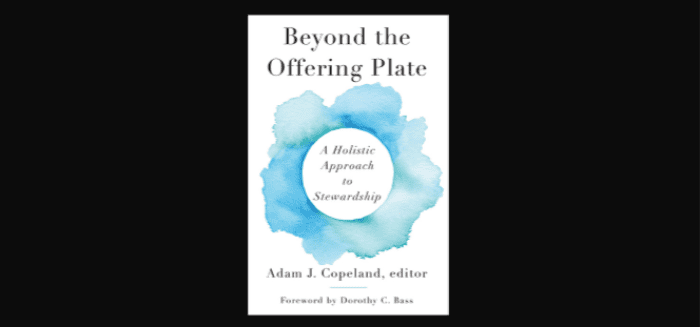Today marks the official release date of a new stewardship book edited by yours truly! Titled, Beyond the Offering Plate: A Holistic Approach to Stewardship, in ten approachable chapters written by seminary professors, engaged pastors, and church leaders, the book aims to expand our notion of—and approaches to—holistic stewardship. For the next several weeks, this newsletter will highlight a series of posts previewing chapters in the book. I hope they might whet your appetite for more.
In today’s post, I’ll describe how the idea for the book came about. After many years of work, it’s such a delight to finally have it available for use by the church.
Yours truly,
Adam Copeland, Center for Stewardship Leaders
Introducing: “Beyond the Offering Plate”
Adam J. Copeland
I often find myself speaking about financial stewardship in churches, synod leadership events, and other faith-related gatherings. In these talks, I often say something like, “Of course, stewardship is about more than money, but today I’ve been asked to speak about that dreaded m-word.” I then go on to speak about one of my favorite topics, financial stewardship in congregational life these days.
Well, after months of giving that stewardship-is-more-than-money-but caveat, I figured it was time to explore what, in fact, the church might take away from stewardship beyond money. I already knew my perspective, so I decided to enlist help. The ideas got cooking pretty good, and thankfully Westminster John Knox Press agreed to publish the project.
Chapters in Beyond the Offering Plate cover aspects of stewardship often not considered in congregational life. For example, the book opens with MaryAnn McKibben Dana’s chapter, “Stewardship of Time: Clocks, Calendars, and Cathedrals” and concludes with Neal Presa’s chapter on stewardship of our minds. Along the way, readers will consider stewardship of body, community, work, death, technology, and more. Margaret Aymer’s chapter on the stewardship of privilege, arguing for a new understanding of incarnation, is plain fantastic. And, of course, there’s a chapter about money and finances written by my brilliant friend David King of the Lake Institute on Faith and Giving.
Given the financial realities of many congregations, some might worry that devoting too much time to the broader topic of stewardship might take valuable attention away from the stewardship of money. I think, instead, that making the stewardship conversation more whole in fact enriches, deepens, and supports financial stewardship. After all, if financial stewardship is just raising the budget, then we’re already missing the point.
I believe just as there exists in the church a hunger for richer, more honest conversation related to money, so too is there space for a claiming the fullness of stewardship.
When I was about halfway into the project, a friend alerted me to an acquaintance’s Facebook status. Clicking over, I found the following in her Facebook status:
Every once in a while, I discover that a word has kind of been hijacked. This happened to the words “orthodox” and “evangelical.” When people hear either word, they have a narrow, specific meaning that pops to mind, and that meaning usually doesn’t work for me. “Stewardship” has had the same fate.
This grand word with sweeping implications for lives of living in communion with all creation, caring for the gifts God has given us…we have decided it really mostly applies to our money.
What a total bummer.
A bummer indeed. Beyond the Offering Plate: A Holistic Approach to Stewardship now exists in the world to help fill that void. All August, newsletter articles will preview chapters from the book. So, keep an eye out, and if you’re the ordering type, the book is available through Amazon, Westminster John Knox Press, Barnes & Noble, and most book sourcing methods.
More Information
Adam J. Copeland is the Director of the Center for Stewardship Leaders.
